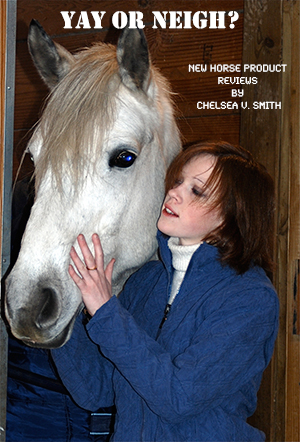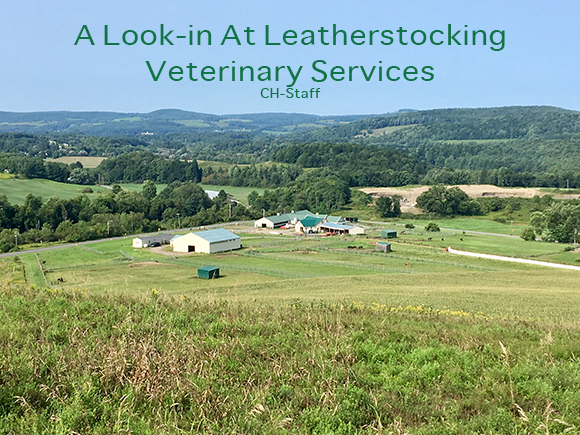A Look-in At Leatherstocking Veterinary Services
CH-Staff
As horse owners we all have questions about the recent outbreaks of equine West Nile in Upstate New York so The Merry Band at The Catskill Horse figured who better to ask what to do than an Upstate based New York veterinary clinic.
We sat down with the team of vets at Leatherstocking Veterinary Services, based in New Berlin, NY that covers a 50 mile radius from their office with ambulatory services for equines and a myriad of other critters great and small, to gather some advice on vaccinations and to learn more about what was new in the neighborhood.
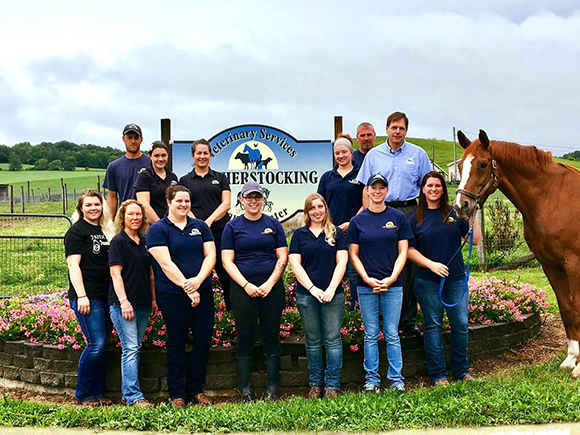
Catskill Horse: What advice can you give horse owners about the West Nile outbreaks in Upstate NY? For example, if a horse has been vaccinated in the last 12 months should a booster be given?
Dr. Judy: While the rain and wet weather has created a lot of headaches for hay season, the mosquito population is thriving! This year there have been 140 confirmed cases of West Nile Virus in New York. Because of this, our team of veterinarians at Leatherstocking Veterinary Services, encourage horse owners to vaccinate their horses against West Nile Virus. During periods of high risk (like now!), a booster should also be administered in the fall. WNV should be an annual vaccine, given at least 4 weeks prior to mosquitoes. The initial vaccine does require a booster. If a booster is not administered within 3-4 weeks following the initial vaccine, your horse’s immune system will be left vulnerable and unable to fight any possible WNV infection. To say bluntly, a vaccine without a booster is a waste of time and money for all horses and their owners.
Catskill Horse: Can West Nile vaccination be given at the same time as other vaccines? Can a vaccinated horse shed the virus to other unprotected horses?
Dr. Judy: The West Nile Virus vaccine is commonly included in a combination vaccine, and is safe to administer at the same time as other vaccines. The vaccine is a killed virus, so it cannot be shed. Remember, West Nile Virus needs a mosquito vector to spread.
Catskill Horse: Do you see many side effects from the administration of this vaccine?
Dr. Judy: Owners may notice mild tenderness and/or swelling at the site of injection but the side effects are generally minimal. Adverse reactions are rare, but each horse will respond differently. We recommend your horses always receive their vaccines from a licensed veterinarian. They are familiar with which core and risk based vaccines your horse should receive, proper handling, the correct location for injection and the right dosage. If a reaction occurs, veterinarians are trained in the proper management if such an event occurs. Our veterinarians can ensure that vaccines are effective and safe and proper handling of the vaccine has occurred.
Catskill Horse: Should older horses (over 20) be vaccinated? What about foals?
Dr. Judy: All equids should be vaccinated, and foals should be vaccinated at the appropriate age recommended by your veterinarian. Older and younger horses especially need the vaccine, as their immune systems are the most susceptible and not as robust.
Catskill Horse: What’s new at LSV? ( any new diagnostic equipped? services? etc?)
LVS Team: We are pleased to have upgraded our digital radiography unit this year. Our new Cuattro system brings up images in under 2 seconds on its light and portable tablet screen. The wireless x-ray plate is easy to move around most horses without making them nervous and now we only need access to a single electrical outlet to get excellent quality radiographs in your barn.
This new system allows us to image areas, which have previously been out of our reach. We are enjoying being able to acquire spinal radiographs (on most horses), and improved skull imaging on top of excellent images of the lower legs and foot.
We also have a new ultrasound and a SAA stall-side blood test that accurately and quickly (within 10 minutes) detects infection. The SAA is more accurate and quicker than the traditional blood test and can help determine if a horse is ill due to an active infection.
Catskill Horse: Have you added nny new vets on staff or new staff on the team?
LVS Team: We have welcomed 3 veterinarians to our team this year: Dr. Judy, Dr. Deanna and Dr. Ram. Dr. Ram is offering lameness services.
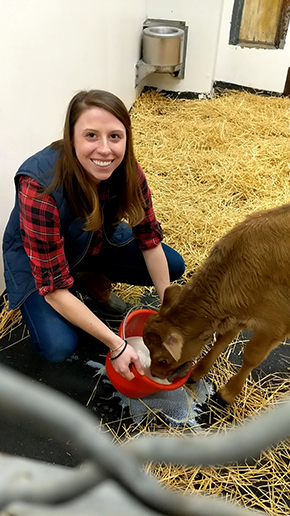 Dr. Deanna grew up in Winchester, Virginia on a beef cattle farm and apple orchard. She attended Virginia Tech and graduated with a degree in Dairy Science and a minor in Animal and Poultry Sciences with a Beef Production emphasis. During her time at Virginia Tech she worked at dairies during the summers and through the school years and experienced a broad range in production systems from 1,000 cow dairies to smaller grazing seasonal dairies in NY and VA. After college she attended The Ohio State University College of Veterinary Medicine and focused on Food Animal Medicine and Equine Medicine.
Dr. Deanna grew up in Winchester, Virginia on a beef cattle farm and apple orchard. She attended Virginia Tech and graduated with a degree in Dairy Science and a minor in Animal and Poultry Sciences with a Beef Production emphasis. During her time at Virginia Tech she worked at dairies during the summers and through the school years and experienced a broad range in production systems from 1,000 cow dairies to smaller grazing seasonal dairies in NY and VA. After college she attended The Ohio State University College of Veterinary Medicine and focused on Food Animal Medicine and Equine Medicine.
Dr. Deanna enjoys most aspects of veterinary medicine but has particular interests in dairy production health and consulting, small ruminant and equine medicine. She has always loved New York and is excited to be living out her dream of being a veterinarian at Leatherstocking Veterinary Services.
Outside of veterinary medicine Dr. Deanna enjoys running, hiking and travelling. She also enjoys spending time with her dog Quinn and trail riding with her Quarter Horse Jack.
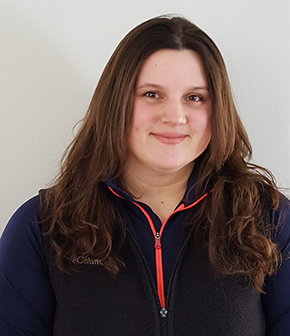 Dr. Judy grew up in New Berlin, NY and was actively involved in horseback riding and 4-H. She attended Cornell University for her undergraduate work, getting a degree in Animal Science. She then went to Cornell University for veterinary school, graduating in 2013. For the first five years out of school she worked as a large animal veterinarian up in northern NY, with an interest in both dairy and equine medicine. In her free time Judy likes to spend time with her husband, Matt, and two young children, as well as ride her two horses.
Dr. Judy grew up in New Berlin, NY and was actively involved in horseback riding and 4-H. She attended Cornell University for her undergraduate work, getting a degree in Animal Science. She then went to Cornell University for veterinary school, graduating in 2013. For the first five years out of school she worked as a large animal veterinarian up in northern NY, with an interest in both dairy and equine medicine. In her free time Judy likes to spend time with her husband, Matt, and two young children, as well as ride her two horses.
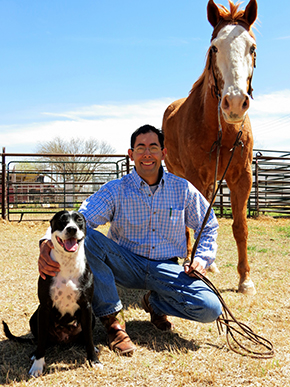 Dr. Ram grew up in New York and graduated with an associates in agriculture science from SUNY Cobleskill and later a bachelors in animal science and biology from Cornell University in 2013. His interest in veterinary medicine grew from managing equine facilities and his position as a dairy herdsman. From 2013-2017 he attended The Ohio State University and focused his studies in equine and bovine medicine. Following veterinary school, Dr. Ram interned at Brock Veterinary Clinic in Lamesa, Texas, a mixed animal practice focused predominately on performance horse medicine.
Dr. Ram grew up in New York and graduated with an associates in agriculture science from SUNY Cobleskill and later a bachelors in animal science and biology from Cornell University in 2013. His interest in veterinary medicine grew from managing equine facilities and his position as a dairy herdsman. From 2013-2017 he attended The Ohio State University and focused his studies in equine and bovine medicine. Following veterinary school, Dr. Ram interned at Brock Veterinary Clinic in Lamesa, Texas, a mixed animal practice focused predominately on performance horse medicine.
Now Dr. Ram is excited to be back in his home state and be helping members of his new community through veterinary medicine!
On the equine side his emphasis includes lameness, joint management, soft tissue surgery and reproduction while on the beef and dairy side his special interests include herd health and reproduction.
In Dr. Ram’s free time, he enjoys riding his horse, working cattle, hiking and camping. He also enjoys all aspects of home remodeling.
Catskill Horse: Have you tried the 5 way Core vaccine yet? Any pros or cons to its use in the field?
LVS Team: This vaccine is not yet available.
Catskill Horse: We saw that you had special discounted rates for your Fall farm schedule for teeth floating and vaccinations. Can you tell us at what age you recommend teeth floating is begun and how often thereafter? We’ve heard that young horses need teeth floated more often than an adult horse. Is that true?
LVS Team: No, it is not true that young horses need their teeth floated more often than adult horses.
Our veterinarians recommend every horse receives an oral exam at least once a year. At the time of evaluation, a decision will be made on what or if the horse needs anything done. An exam should be routinely scheduled because there may be issues owners may be unaware of, such as cracked teeth, retained deciduous teeth (caps) or sharp points. Every horse is different and dental issues can occur in horses as young as 2 (retained caps) or in any other age. Based on mouth alignment, some horses need work as often as twice a year and others can go years in between.
Catskill Horse: Any special advice regarding what your team are seeing issue wise with horse health this season and preventative care that horse owners can take to avoid a vet call?
LVS Team: Our doctors are seeing a lot of tick-borne diseases, such as Lyme and Anaplasmosis. We recommend owners keep their pastures mowed and be diligent on checking their horses for ticks. Body scans for ticks should be performed daily. You may also apply an equine-approved fly, mosquito & tick repellent spray daily for additional protection. An off-label Lyme vaccine is available and may be used in horses. We are currently looking forward to a horse-approved Lyme vaccine for next spring or 2020.
Wet and muddy season is here again, and horses should have a dry area to prevent hoof problems, such as thrush and abscesses.
Dr. Kathy: I encourage owners to be ready for colder temperatures! As the temperature decreases, make sure water buckets are free from ice and an appropriate amount of water is being taken in to prevent colic.
Catskill Horse: Do you have any plans to extend your coverage area with these new vets on board? We believe right now it is 50 miles?
LVS Team: No. Our coverage area will not be extended. We are currently focusing on providing excellent care to our clients within our area.
Catskill Horse: Any special news on any of your staff members? Accreditations? New family members etc?
LVS Team: Dr. Bill has earned his MBA and Dr. Christine married the love of her life in September!
As you can see we have questions and the team at Leatherstocking Veterinary Services have answers. If you would like to schedule them for a visit take advantage of their special discount services and set up an appointment today. In addition to their ambulatory services they offer a full range of clinic services available and clients are welcome to attend their variety of hosted ‘teaching moments’ events at their New Berlin location.

